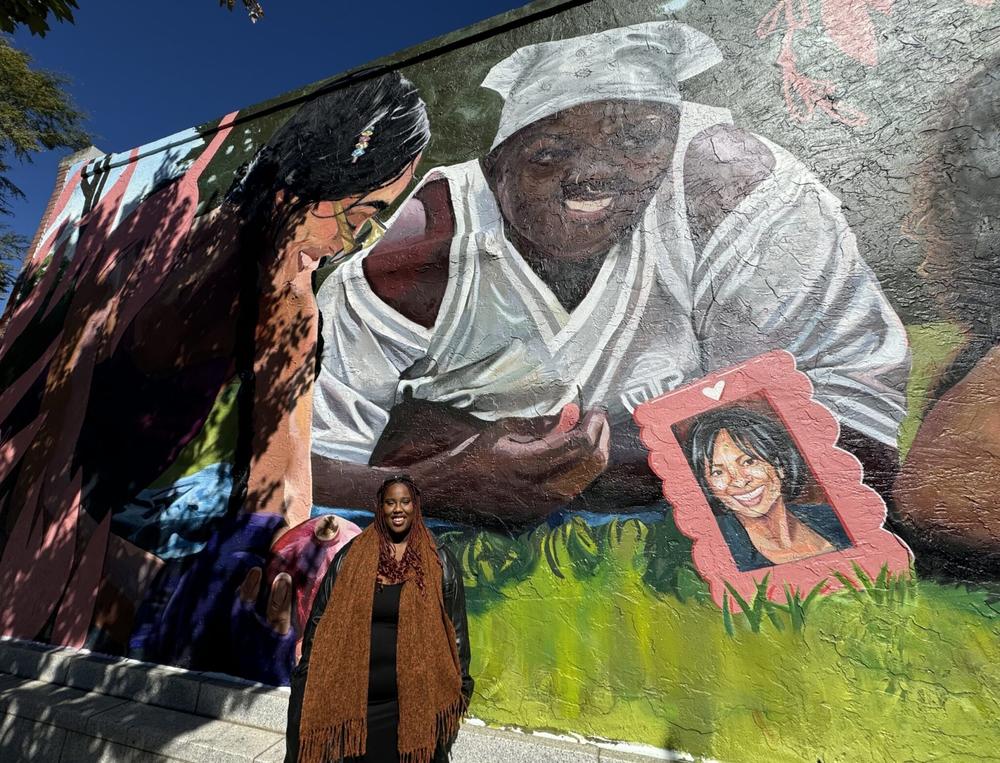
Caption
Danae Antoine, who is an Atlanta-based artist, poses for a photo they designed and painted memorializing two Georgia women who died trying to have an abortion.
Credit: Jill Nolin/Georgia Recorder

Danae Antoine, who is an Atlanta-based artist, poses for a photo they designed and painted memorializing two Georgia women who died trying to have an abortion.
A new mural memorializing two Georgia women who died after trying to have an abortion has been unveiled in Decatur, serving as a public reminder of what advocates say is the harm caused by abortion bans.
Free & Just, which is a national organization that uses storytelling to highlight the impact of abortion restrictions, sponsored the mural as part of its “Artists for Abortion Access” series in collaboration with Living Walls.
The mural is massive – the painting is 60 feet long and 15 feet high – but the message is subtle. Figures are shown lounging on the grass with two framed photos of women in the foreground depicting Candi Miller and Amber Nicole Thurman.
One woman is holding a pomegranate in her hand, which Atlanta-based artist Danae Antoine said is a symbol of birth and the womb and its presence in the mural represents freedom and agency.
“I think that people are drawn to the figure, and we’ve done it for literally hundreds of years, because you see yourself, you see another person, you see another being,” Antoine said.
“And I think that that is such a strong line in reaching a sense of empathy. If you see another person, if you see these two women who passed, you can’t tell yourself that these stories don’t matter,” they added.
Antoine said they also wanted to convey a sense of community through the project and how community is an essential part of health care. A sign on the mural makes clear that the painting is a tribute to Miller and Thurman who died “after being denied access to abortion due to Georgia’s abortion ban.”
The mural is on the side of a store in the busy Square in Decatur, which is just outside of Atlanta.
Georgia’s 2019 law bans most abortion once fetal cardiac activity is detected, which is about six weeks into a pregnancy and before most women know they are pregnant.
The circumstances of Thurman and Miller’s deaths became public last month through stories published by ProPublica. The two women died after trying to have an abortion shortly after Georgia’s law took effect in 2022.
Both deaths were officially deemed preventable by the state’s Maternal Mortality Review Committee, according to ProPublica, and have reignited a debate over an exception in Georgia’s law that purports to protect mothers when their own life is threatened.
Thurman’s case has been highlighted on the national level by opponents of abortion bans.
The 28-year-old attempted to terminate her pregnancy using abortion medication from a clinic in North Carolina. But when she experienced a rare complication and went to an Atlanta-area hospital for treatment, the doctors waited 20 hours to perform a dilation and curettage, or D&C, to treat sepsis that resulted from an incomplete abortion.
Anti-abortion advocates have pushed back on attempts to tie the women’s deaths to Georgia’s abortion law and accused the other side of trying to capitalize on the tragedies. They argue that the law’s medical emergency exception should have protected the women and that in Thurman’s case, medical providers should have intervened sooner.
This story comes to GPB through a reporting partnership with Georgia Recorder.